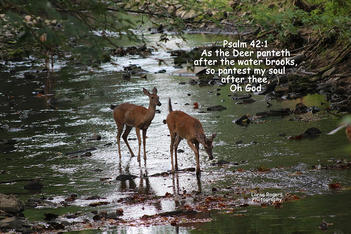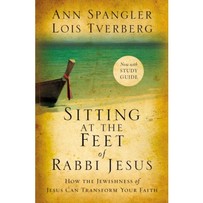
In the Bible Study that I lead at my church we are studying the Psalms. Our study last Sunday was of Psalms 42 and 43.
In these Psalm the writer is despondent because he can’t go to the Temple as he has been able to in the past. He’s hounded by enemies who are keeping him from making the trip.
At the time that these Psalms were written the people of Israel believed that God’s presence was at the Temple in Jerusalem and that they had to get there in order to be in His presence. The writer’s longing for God’s presence was overwhelming.
The application for us today when we wonder if God has forgotten us or if He hear us at all we can say as the psalmist said that our hope and trust is in God. In his desperation and depression he did some things that are suggestions for us today:
- Desperately seek to get into God’s presence.
Psalm 42:1-2 NIV As the deer pants for streams of water, so my soul pants for you, my God. My soul thirsts for God, for the living God. When can I go and meet with God?
- Remember
Psalm 42:4 NIV These things I remember as I pour out my soul: how I used to go to the house of God under the protection of the Mighty One with shouts of joy and praise among the festive throng.
Psalm 42:6-8 NIV My soul is downcast within me; therefore I will remember you from the land of the Jordan, the heights of Hermon—from Mount Mizar. Deep calls to deep in the roar of your waterfalls; all your waves and breakers have swept over me. By day the Lord directs his love, at night his song is with me— a prayer to the God of my life.
- Put your hope in God
Psalm 42:5 NIV Why, my soul, are you downcast? Why so disturbed within me? Put your hope in God, for I will yet praise him, my Savior and my God.
Psalm 42:11 NIV Why, my soul, are you downcast? Why so disturbed within me? Put your hope in God, for I will yet praise him, my Savior and my God.
Psalm 43:5 NIV Why, my soul, are you downcast? Why so disturbed within me? Put your hope in God, for I will yet praise him, my Savior and my God.
- Praise God
Psalm 42:5 NIV Why, my soul, are you downcast? Why so disturbed within me? Put your hope in God, for I will yet praise him, my Savior and my God.
Psalm 43:4 NIV Then I will go to the altar of God, to God, my joy and my delight. I will praise you with the lyre, O God, my God.
In her book Sitting at the Feet of Rabbi Jesus Ann Spangler gives us a glimpse of what it must have been like for the disciples of Jesus to be in God’s presence as they sat at the feet of Rabbi Jesus.

A Sense of God's Presence
by Ann Spangler, from Sitting at the Feet of Rabbi Jesus
To many people in the modern world, God seems remote and unconcerned, living light years away in another dimension called “Heaven.” Does God, the Creator of the entire universe, honestly care about our infinitesimally small problems? Most of us would say yes because we know that’s the way we should answer the question. But we ache for a deeper, more immediate sense of God’s nearness. We want rock-solid assurance of His faithful care.
Why is it sometimes so difficult to believe God cares about us? Many of us have been shaped not so much by a biblical worldview as by a secular one. Our Western world has been heavily influenced by Enlightenment philosophers who pictured God as a “divine watchmaker” — a being who set the universe in motion and then sat back to watch it tick.
But the Bible says the opposite. It pictures God not far away but intimately close, speaking to people like Abraham, Jacob, Joseph, and Moses. He actively intervened on behalf of His people, leading them out of Egypt and into the Promised Land. Years later God came to earth in the person of Jesus Christ. And now His Spirit is alive in those who believe.
Scripture reveals a God neither distant nor uncaring but one intensely interested in the world He has made.
But Western philosophy has made us doubt the biblical picture.
To remind people of God’s active presence in the world, some synagogues have inscribed the words Da Lifne Mi Atah Omed, meaning, “Know Before Whom You Stand,” above the ornate Torah scroll cabinet at the front of the synagogue. These words inspire a sense of awe, perhaps even a little terror, because they are saying: Don’t forget that you are standing in the presence of God Himself.
The idea that we are continually in the presence of God is greatly emphasized in some branches of Judaism. The reason many Jewish men wear yarmulkes is to remind themselves to be humbly in awe of God’s presence all around them.1 The writer Annie Dillard has a memorable way of highlighting Christians’ relative nakedness before God, emphasizing how cavalierly we treat the privilege of standing in God’s presence Sunday after Sunday:
Why do people in church seem like cheerful, brainless tourists on a packaged tour of the Absolute?… Does anyone have the foggiest idea what sort of power we blithely invoke? Or, as I suspect, does no one believe a word of it? The churches are children playing on the floor with their chemistry sets, mixing up a batch of TNT to kill a Sunday morning. It is madness to wear ladies’ straw hats and velvet hats to church. We should all be wearing crash helmets.2
In a sense, that’s what Jewish head coverings are — little “crash helmets” reminding them of the God who is infinitely powerful, but yet so near.
Is it possible to cultivate a sense of God’s presence, particularly during prayer? There is a Hebrew word that deals with the question: kavanah, which means “intention” or “direction.” The word conveys the idea of being profoundly aware of the One to whom you are speaking as you direct your heart toward Heaven. “A prayer without kavanah is like a body without a soul,” say the rabbis. It’s a lifeless, dead corpse. Because so many Jewish prayers are repeated, the rabbis emphasized the need for kavanah, so that each time a person prays, the words are fresh and full of passion, with a sense of reverence for the awesome God who is their focus.
Kavanah literally means intention or concentration. It has to do with turning our hearts deliberately towards Jesus throughout our regular day as an act of worship. We can be doing normal chores, business work, balancing the budget, or in worship in a church service and be practicing kavanah.
The following are blessings from the Amidah, which is the is the central prayer of the Jewish liturgy.
- Heal us and we shall be healed, help us and we shall be helped, for You are our joy. Grant full healing for all our wounds, for You, O God and King, are a true and merciful physician. Blessed are You, O Lord, who heals the sick of His people Israel.
- Bless for us, O Lord our God, this year and all of its yield for good, and shower down a blessing upon the face of the earth. Fill us with Your bounty and bless our year, that it be as the good years. Blessed are You, O Lord, who blesses the years.
- We acknowledge to You, O Lord, that You are our God as You were the God of our fathers, forever and ever. Rock of our life, Shield of our salvation, You are unchanging from age to age. We thank You and declare Your praise, for our lives that are in Your hands and for our souls that are entrusted to You. Your miracles are with us every day, and Your benefits are with us at all times, evening and morning and midday. You are good, for Your mercies are endless; You are merciful, for Your kindnesses are never complete; from everlasting we have hoped in You. And for all these things may Your name be blessed and exalted, always and forevermore. Let every living thing give thanks to You and praise Your name in truth, O God, our salvation and our help. Blessed are You, O Lord, Your name is good, and to You it is right to give thanks.
Excerpted with permission from Sitting at the Feet of Rabbi Jesus by Ann Spangler and Lois Tverberg, copyright Ann Spangler and Lois Tverberg.
Sitting at the Feet of Rabbi Jesus~
How the Jewishness of Jesus can Transform Your Faith
by Ann Spangler & Lois Tverberg
A rare chance to know Jesus as His first disciples knew Him.
What would it be like to journey back to the first century and sit at the feet of Rabbi Jesus as one of His Jewish disciples? How would your understanding of the gospel have been shaped by the customs, beliefs, and traditions of the Jewish culture in which you lived?
Sitting at the Feet of Rabbi Jesus takes you on a fascinating tour of the Jewish world of Jesus, offering inspirational insights that can transform your faith. Ann Spangler and Lois Tverberg paint powerful scenes from Jesus’ ministry, immersing you in the prayers, feasts, history, culture, and customs that shaped Jesus and those who followed Him. You will hear the parables as they must have sounded to first-century Jews, powerful and surprising. You will join the conversations that were already going on among the rabbis of His day. You will watch with new understanding as the events of His life unfold. And you will emerge with new excitement about the roots of your own Christian faith.
Sitting at the Feet of Rabbi Jesus will change the way you read Scripture and deepen your understanding of the life of Jesus.


 RSS Feed
RSS Feed